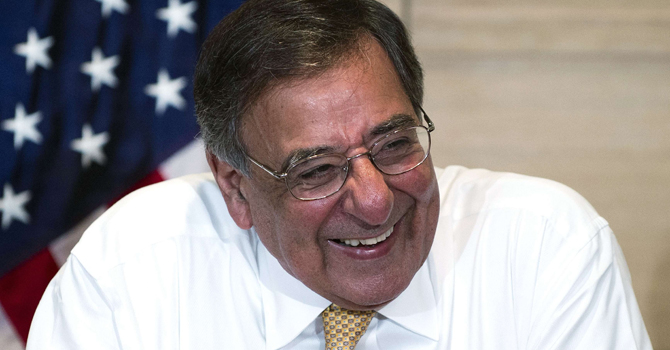NEW DELHI: Pentagon chief Leon Panetta vowed Wednesday to expand defence ties between India and the United States, saying New Delhi was a “lynchpin” in a new US military strategy focused on Asia.
At a think-tank in the Indian capital, Panetta said that military ties had dramatically improved over the past decade.
But he said more work was needed to ensure the two countries could safeguard the “crossroads” of the global economy spanning the Indian Ocean and the western Pacific.
“For this relationship to truly provide security for this region and for the world, we will need to deepen our defence and security cooperation.
“This is why I have come to India,” Panetta told an audience at the Institute for Defence Studies and Analyses.
Having overcome suspicions from the Cold War-era, “our two nations I believe have finally and irreversibly started a new chapter of our history”.
Panetta, who met with Indian leaders on Tuesday and Wednesday, said he believed the relationship “can and should become more strategic, more practical, and more collaborative.”He said a new US strategy sought to “expand our military partnerships and our presence in the arc extending from the Western Pacific and East Asia into the Indian Ocean region and South Asia.””Defence cooperation with India is a lynchpin in this strategy.”
Panetta called for more joint research and production, expanding military exercises and for both countries to tackle legal dilemmas posed by space weapons and cyber warfare.
Security ties with India have steadily improved but US officials have yet to realise the goal of a game-changing partnership that could check China's role, analysts say.
India favours improving military ties and buying weapons from the United States but does not want to become a full-fledged American ally, preferring a degree of breathing space, analysts say.
Panetta's visit has focused in part on the planned withdrawal of US-led forces from Afghanistan by the end of 2014, with India concerned about a dangerous vacuum after foreign troops exit.
The United States favoured a more active role for India in Afghanistan, Panetta said in his speech.
“I urged India's leaders to continue with additional support to Afghanistan through trade and investment, reconstruction, and help forAfghanistan's security forces,” he said.
A day after Al-Qaeda's number two leader was killed in a drone strike in Pakistan, Panetta acknowledged that both India and the United States faced difficulties with Islamabad.
“Pakistan is a complicated relationship for both of our countries, but one that we must work to improve,” he said.
The US tilt towards Asia -- including closer ties to New Delhi -- is widely seen as a response to China's growing military and economic might, particularly in the South China Sea.
But Panetta said both the United States and India wanted to see Beijing play a prominent role in the region.
“As the United States and India deepen our defence partnership with each other, both of us will also seek to strengthen our relations with China,” he said.
He hailed growing arms sales with India but said both countries needed to remove obstacles that were holding back defence trade and the transfer of technology.
“To realise the full potential of defence trade relations, we need to cut through the bureaucratic red tape on both sides,” he said. Panetta said he had ordered Deputy Defence Secretary Ashton Carter to lead an effort with Indian leaders to streamline procedures on arms deals.
The US defence chief's visit to India was part of a regional tour that included stops in Singapore and Vietnam, as Panetta sought to define Washington's plans to shift towards Asia.
Some commentators in the United States and Asia have questioned the substance of the declared “rebalancing”, and whether the US will be able to deliver on its rhetoric to build partnerships and expand its naval presence.
Panetta told reporters the next step would require deeds and not just words.
“We now have to put meat on the bone, which means we have to follow through with actions,” Panetta said.













































Dear visitor, the comments section is undergoing an overhaul and will return soon.